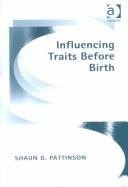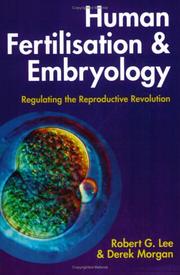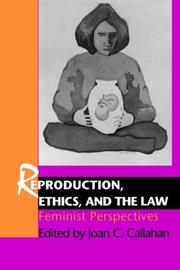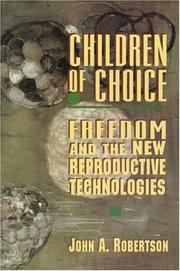| Listing 1 - 7 of 7 |
Sort by
|

ISBN: 075462286X 9780754622864 Year: 2002 Publisher: Aldershot Ashgate
Abstract | Keywords | Export | Availability | Bookmark
 Loading...
Loading...Choose an application
- Reference Manager
- EndNote
- RefWorks (Direct export to RefWorks)
"Designer babies" are frequently reported as being on the horizon, but is it ethical to create such beings? The author explores this dilemma from a legal and ethical perspective and pays tribute to Alan Gewirth's Principle of Genetic Consistency in the process.In this text the author presents a moral critique of the laws governing the creation of "designer babies." Alan Gewirth's Principle of Generic Consistency is used as the starting point for developing a framework, which is then used to critique the legal position in the EU countries (with particular reference to the UK), Canada and the USA. The conclusion the author reaches is that a proper moral response to the issues covered must take account of specified prima facie presumptions, to be applied by legitimately appointed regulatory bodies. The text assesses the adequacy of existing regulatory responses by reference to these presumptions. Also containing detailed appendices summarizing the legal position with regard to abortion and prenatal diagnosis, preimplantation genetic diagnosis, in vitro embryo research, cloning, and germ-line gene therapy in the countries mentioned above, this volume is an indispensable resource for both students and scholars with a keen interest in this highly contested field.
Medical ethics. --- Prenatal influences. --- Reproductive technology --- Moral and ethical aspects. --- prenatale diagnostiek (prenatale test) --- pre-implantatie genetische diagnose (PGD) --- kloneren (klonen) --- embryo-onderzoek (embryo's in vitro) --- Biomedical ethics --- Clinical ethics --- Ethics, Medical --- Health care ethics --- Medical care --- Medicine --- Bioethics --- Professional ethics --- Nursing ethics --- Social medicine --- Assisted reproduction --- Reproduction --- Biotechnology --- Children --- Fetus --- Pregnancy --- diagnostic prénatal (test prénatal, DPN) --- diagnostique génétique pré-implantatoire (DPI, diagnostic préimplantatoire) --- clonage --- recherche sur l'embryon (embryons in vitro) --- Moral and ethical aspects --- Technological innovations --- Prenatal influences --- Medical ethics --- ART (Assisted reproductive technology) --- Assisted reproductive technology --- Reproductive techniques --- Reproductive technology - Moral and ethical aspects

Abstract | Keywords | Export | Availability | Bookmark
 Loading...
Loading...Choose an application
- Reference Manager
- EndNote
- RefWorks (Direct export to RefWorks)
Based on the "Guide to the Human Fertilisation and Embryology Act 1990", this volume reviews the regulation of assisted conception including complex moral issues such as abortion, embryo research and cloning. It offers a comprehensive guide to the 1990 legislation as well as important legal and technical developments since that time.
Human reproductive technology --- -#GBIB:CBMER --- reproductieve technologie (voortplantingstechnologie, medisch begeleide voortplanting, MBV, artificiële voortplanting, kunstmatige voortplanting) --- draagmoederschap (zwangerschap-voor-een-ander, draagmoeder, surrogaatmoeder) --- embryo-onderzoek (embryo's in vitro) --- Assisted human reproduction --- Assisted conception --- Conception --- Human assisted reproduction --- Human reproduction --- Medical technology --- Reproductive technology --- Law and legislation --- technique de reproduction (technique de procréation, procréation médicalement assistée, PMA, assistance médicale à la procréation, AMP, procréation artificielle) --- maternité de substitution (grossesse de substitution, gestation pour autrui, mère-porteuse, mère de substitution) --- recherche sur l'embryon (embryons in vitro) --- Technological innovations --- #GBIB:CBMER --- Assisted human reproductive technology --- Human assisted reproductive technology
Book
ISBN: 2717831061 9782717831061 Year: 1996 Publisher: Paris Economica
Abstract | Keywords | Export | Availability | Bookmark
 Loading...
Loading...Choose an application
- Reference Manager
- EndNote
- RefWorks (Direct export to RefWorks)
Le respect de la personne humaine concerne-t-il aussi l'embryon humain ? Nul ne peut demeurer insensible à une telle question dont la réponse conditionne directement la légitimité des pratiques qui touchent cet embryon : la recherche d'une qualification ou à tout moins la détermination d'une protecion minimale sont au cœur d'un débat de société fondamental. Le colloque national pluri-disciplinaire organisé par le CRJO s'est inscrit dans cette démarche. Anthropologues, philosophes, biologistes, médecins, juristes et réprésentant des différentes tendances de pensée se sont penchés ensemble sur ce délicat problème.
Embryon humain --- Ethique médicale --- Human embryo --- Medical ethics --- Human reproductive technology --- Embryo, Mammalian --- Reproduction Techniques --- Ethics, Medical --- Research --- Moral and ethical aspects --- Congresses. --- congresses. --- -Human reproductive technology --- -Medical ethics --- -embryo-onderzoek (embryo's in vitro) --- embryostatuut (moreel statuut van het embryo, juridisch statuut van het embryo, potentiële persoon) --- reproductieve technologie (voortplantingstechnologie, medisch begeleide voortplanting, MBV, artificiële voortplanting, kunstmatige voortplanting) --- Biomedical ethics --- Clinical ethics --- Health care ethics --- Medical care --- Medicine --- Bioethics --- Professional ethics --- Nursing ethics --- Social medicine --- Assisted human reproduction --- Assisted conception --- Conception --- Human assisted reproduction --- Human reproduction --- Medical technology --- Reproductive technology --- Embryo, Human --- Embryology, Human --- -Moral and ethical aspects --- Congresses --- recherche sur l'embryon (embryons in vitro) --- statut de l'embryon (statut moral de l'embryon, statut juridique de l'embryon, personne potentielle) --- technique de reproduction (technique de procréation, procréation médicalement assistée, PMA, assistance médicale à la procréation, AMP, procréation artificielle) --- Technological innovations --- Embryo --- Ethique médicale --- embryo-onderzoek (embryo's in vitro) --- Research&delete& --- Moral and ethical aspects&delete& --- Human embryo - Research - Moral and ethical aspects - Congresses --- Medical ethics - Congresses. --- Human reproductive technology - Congresses. --- Embryo, Mammalian - congresses --- Reproduction Techniques - congresses. --- Ethics, Medical - congresses --- Droit medical et bioethique

ISBN: 2742000860 9782742000869 Year: 1995 Publisher: Montrouge: Libbey,
Abstract | Keywords | Export | Availability | Bookmark
 Loading...
Loading...Choose an application
- Reference Manager
- EndNote
- RefWorks (Direct export to RefWorks)
Human reproduction --- Bioethics --- Reproduction humaine --- Bioéthique --- Moral and ethical aspects --- Congresses --- Aspect moral --- Congrès --- Ethique médicale --- 174.2 --- #GBIB:CBMER --- Reproduction --- Ethics, Medical --- Reproductive Techniques --- anticonceptie (voorbehoedsmiddelen, contraceptie, geboortecontrole) --- foetaal weefsel --- neonatale intensieve zorg --- eiceldonatie (eicel) --- zaadceldonatie (spermadonatie) --- draagmoederschap (zwangerschap-voor-een-ander, draagmoeder, surrogaatmoeder) --- vrouwenbesnijdenis (vrouwelijke genitale verminking) --- sekseselectie (geslachtsselectie) --- embryo-onderzoek (embryo's in vitro) --- Reproduction Technics --- Reproduction Techniques --- Reproductive Technologies --- Technology, Reproductive --- Reproductive Technology --- Reproduction Technic --- Reproduction Technique --- Reproductive Technique --- Technic, Reproduction --- Technics, Reproduction --- Technique, Reproduction --- Technique, Reproductive --- Techniques, Reproduction --- Techniques, Reproductive --- Technologies, Reproductive --- Selective Breeding --- Reproductive Medicine --- Reproductive Health Services --- Medical Ethics --- Medicine --- Professionalism --- Human Reproductive Index --- Human Reproductive Indexes --- Reproductive Period --- Human Reproductive Indices --- Index, Human Reproductive --- Indexes, Human Reproductive --- Indices, Human Reproductive --- Period, Reproductive --- Periods, Reproductive --- Reproductive Index, Human --- Reproductive Indices, Human --- Reproductive Periods --- Human physiology --- Reproductive health --- Reproductive rights --- Beroepsmoraal van de artsen. Medische beroepsethiek --- contraception (contrôle des naissances) --- tissus foetaux --- soins néonataux intensifs --- don d'ovules (don d'ovocytes, ovule, ovocyte) --- don de sperme --- maternité de substitution (grossesse de substitution, gestation pour autrui, mère-porteuse, mère de substitution) --- excision (circoncision féminine, mutilation sexuelle féminine) --- sélection de sexe (choix du sexe) --- recherche sur l'embryon (embryons in vitro) --- ethics --- Conferences - Meetings --- 174.2 Beroepsmoraal van de artsen. Medische beroepsethiek --- Bioéthique --- Congrès --- Morale --- Reproduction humaine - Aspect moral - Congres --- Ethique médicale - Congrès --- Éthique des médecins -- actes de congrès --- Fécondation in vitro --- Procréation médicalement assistée --- Reproduction techniques
Book
ISBN: 9780199589555 0199589550 Year: 2012 Publisher: Oxford, UK Oxford University Press
Abstract | Keywords | Export | Availability | Bookmark
 Loading...
Loading...Choose an application
- Reference Manager
- EndNote
- RefWorks (Direct export to RefWorks)
The Law and Ethics of Medicine: Essays on the Inviolability of Human Life explains the principle of the inviolability of human life and its continuing relevance to English law governing aspects of medical practice at the beginning and end of life. The book shows that the principle, though widely recognized as an historic and foundational principle of the common law, has been misunderstood in the legal academy, at the Bar and on the Bench. Part I of the book identifies the confusion and clarifies the principle, distinguishing it from 'vitalism' on the one hand and a 'qualitative' evaluation of human life on the other. Part II addresses legal aspects of the beginning of life, including the history of the law against abortion and its relevance to the ongoing abortion debate in the US; the law relating to the 'morning after' pill; and the legal status of the human embryo in vitro. Part III addresses legal aspects of the end of life, including the euthanasia debate; the withdrawal of tube-feeding from patients in a 'persistent vegetative state'; and the duty to provide palliative treatment.This unique collection of essays offers a much-needed clarification of a cardinal legal and ethical principle and should be of interest to lawyers, bioethicists, and healthcare professionals (whether they subscribe to the principle or not) in all common law jurisdictions and beyond. The principle of the sanctity of life is key to the law governing medical practice and professional medical ethics. It is also widely misunderstood. This book clarifies the principle and considers how it influences the law governing abortion; 'test-tube' babies; euthanasia; feeding patients in persistent vegetative states; and palliative treatment.
medisch recht (biomedisch recht) --- bio-ethiek (medische, biomedische ethiek, bio-ethische aspecten) --- abortus (vrijwillige zwangerschapsafbreking) --- embryo-onderzoek (embryo's in vitro) --- levenseinde (einde van het leven, levenseindebeslissing) --- euthanasie --- palliatieve zorgen, (terminale, continue) sedatie, pijnbestrijding met levensverkortend effect, stervensbegeleiding --- Medical laws and legislation. --- Medical ethics. --- Right to life. --- Ethics, Medical --- Legislation, Medical --- Value of Life --- Economic Life Valuation --- Economic Value, Life --- Economic Values, Life --- Life Economic Value --- Life Economic Values --- Respect for Life --- Right to Life --- Sanctity of Life --- Valuation, Economic Life --- Economic Value of Life --- Life Valuation, Economic --- Economic Life Valuations --- Life Sanctities --- Life Sanctity --- Life Valuations, Economic --- Life, Respect for --- Life, Right to --- Valuations, Economic Life --- Quality of Life --- Social Values --- Medical Legislation --- Medicine --- Medical Ethics --- Professionalism --- Bioethics --- Respect for life --- Right of life --- Right to life (International law) --- Human rights --- Biomedical ethics --- Clinical ethics --- Health care ethics --- Medical care --- Professional ethics --- Nursing ethics --- Social medicine --- Law, Medical --- Medical personnel --- Medical registration and examination --- Physicians --- Surgeons --- Medical policy --- Medical jurisprudence --- droit médical (droit biomédical) --- bioéthique (éthique médicale, biomédicale, aspects bioéthiques) --- avortement (interruption volontaire de grossesse, IVG) --- recherche sur l'embryon (embryons in vitro) --- fin de vie (décision de fin de vie) --- soins palliatifs, lutte contre la douleur ayant pour effet d'abréger la vie, sédation palliative (terminale, continue), accompagnement de fin de vie --- ethics --- legislation & jurisprudence --- Moral and ethical aspects --- Legal status, laws, etc. --- Law and legislation --- Medical ethics --- Medical laws and legislation --- Right to life

ISBN: 025320996X 0253329388 Year: 1995 Publisher: Bloomington Indiana University Press
Abstract | Keywords | Export | Availability | Bookmark
 Loading...
Loading...Choose an application
- Reference Manager
- EndNote
- RefWorks (Direct export to RefWorks)
"Reproduction, Ethics, and the Law" addresses some of the most pressing moral and legal quandaries in contemporary society - those revolving around human reproduction. Technology can both limit and assist childbearing. Courts have assigned legal parenthood to genetic parents of children carried to term by women genetically unrelated to them, and courts have also passed over genetic progenitors to assign parenthood to individuals socially related to children. With developments in medical and surgical interventions for foetus', we have also seen court cases holding women responsible for causing prenatal harm, as well as a landmark Supreme Court decision that might well release industry from liability for causing prenatal harm in the workplace. Scientists are able to use tissue from aborted fetuses to substantially alter the quality of life for persons afflicted with progressive, debilitating disease, and they are now able to fertilize and implant in women's wombs eggs harvested from aborted female fetuses. Physicians are able to sustain infants with no hope for characteristically human lives long enough to make their organs available to other infants in vital need; and they are able to perform prenatal diagnoses that encourage elective abortion. This collection of essays adds to the feminist dimension of the public discussion of how these issues should be addressed. The contributors broaden the discussion considerably in focusing on issues beyond abortion and reproductive technologies, bringing together such themes as surrogacy, adoption, and infertility; frozen embryos and fathers rights; RU 486; foetal harm; and industrial health hazards for women. This volume brings together feminist social and philosophical theory with a practical awareness of concrete social problems and an understanding of new technologies. The contributors are Barbara J. Berg, Joan E. Bertin, Joan C. Callahan, Janet Gallagher, Helen B. Holmes, Joan Mahoney, Mary B. Mahowald, Uma Narayan, Christine Overall, Laura Purdy, Mary L. Shanley, Janice G. Raymond, Patricia Smith, and Rosemarie Tong.
Feminism--Philosophy --- Feminist sociology --- Feminist theory --- Feministische theorie --- Theory of feminism --- Théorie féministe --- Feminist theory. --- Human reproductive technology --- Government policy. --- Moral and ethical aspects. --- Social aspects. --- reproductieve technologie --- feminisme (feministische visie) --- ouderschap --- abortus (vrijwillige zwangerschapsafbreking) --- anticonceptie (voorbehoedsmiddelen, contraceptie, geboortecontrole) --- embryo-onderzoek (embryo's in vitro) --- sekseselectie (geslachtsselectie) --- technique de reproduction --- féminisme --- parentalité --- avortement (interruption volontaire de grossesse, IVG) --- contraception (contrôle des naissances) --- recherche sur l'embryon (embryons in vitro) --- sélection de sexe (choix du sexe) --- Humanism --- Parents --- Therapeutics --- Genetic Engineering --- Persons --- Health Care Economics and Organizations --- Embryonic Structures --- Ethics, Clinical --- Patient Rights --- Diseases --- Prenatal Injuries --- Germ Cells --- Sexual Behavior --- Estrenes --- Health Behavior --- Family Relations --- Investigative Techniques --- Economics --- Genital Diseases, Male --- Genital Diseases, Female --- Sociology --- Tissue Preservation --- Preservation, Biological --- Tissue Transplantation --- Patient Acceptance of Health Care --- Environmental Pollutants --- Maternal Behavior --- Technology, Industry, and Agriculture --- Delivery, Obstetric --- Psychology, Social --- Reproductive Physiological Phenomena --- Women --- Mental Disorders --- Socioeconomic Factors --- Reproductive Physiological Processes --- Reproductive Techniques, Assisted --- Social Problems --- Insemination --- Social Sciences --- Obstetric Surgical Procedures --- Chemicals and Drugs --- Family --- Behavior --- Technology, Industry, Agriculture --- Named Groups --- Histocytological Preparation Techniques --- Psychiatry and Psychology --- Analytical, Diagnostic and Therapeutic Techniques and Equipment --- Ethics, Professional --- Pregnancy Complications --- Surgical Procedures, Operative --- Health Care --- Transplantation --- Anatomy --- Toxic Actions --- Ethics --- Anthropology, Education, Sociology and Social Phenomena --- Male Urogenital Diseases --- Genitalia --- Genetic Techniques --- Attitude to Health --- Female Urogenital Diseases --- Population Characteristics --- Behavior and Behavior Mechanisms --- Nuclear Family --- Reproductive and Urinary Physiological Phenomena --- Specimen Handling --- Cells --- Estranes --- Philosophy --- Phenomena and Processes --- Steroids --- Laboratory Techniques and Procedures --- Chemical Actions and Uses --- Delivery of Health Care --- Female Urogenital Diseases and Pregnancy Complications --- Urogenital System --- Humanities --- Histological Techniques --- Cytological Techniques --- Polycyclic Compounds --- Diagnosis --- Health Care Quality, Access, and Evaluation --- Clinical Laboratory Techniques --- Cryopreservation --- Infertility --- Insemination, Artificial --- Spermatozoa --- Tissue Donors --- Fathers --- Poverty --- Sex Preselection --- Civil Rights --- Homosexuality --- Human Rights --- Social Control, Formal --- Oocyte Donation --- Treatment Refusal --- Ethics, Medical --- Feminism --- Government Regulation --- Prejudice --- Sexuality --- Abortion, Eugenic --- Fees and Charges --- Mifepristone --- Industry --- Reproductive Techniques --- Cesarean Section --- Fetal Tissue Transplantation --- Disabled Persons --- Maternal-Fetal Relations --- Parent-Child Relations --- Reproduction --- Jurisprudence --- Internationality --- Pharmaceutical Preparations --- Prenatal Exposure Delayed Effects --- Embryo, Mammalian --- Pregnancy --- Surrogate Mothers --- Substance-Related Disorders --- Pregnant Women --- Women's Rights --- Abortion, Induced --- Adoption --- Fetus --- International Cooperation --- Hazardous Substances --- Contraception --- Minority Groups --- Medicine --- Health & Biological Sciences --- Gynecology & Obstetrics --- Moral and ethical aspects --- Social aspects --- Government policy --- Human reproductive technology - Government policy. --- Assisted human reproduction --- Assisted conception --- Conception --- Human assisted reproduction --- Human reproduction --- Medical technology --- Reproductive technology --- Feminist philosophy --- Technological innovations --- Assisted human reproductive technology --- Human assisted reproductive technology

ISBN: 0691036659 1400821207 1400813131 Year: 1994 Publisher: Princeton, New Jersey : Princeton University Press,
Abstract | Keywords | Export | Availability | Bookmark
 Loading...
Loading...Choose an application
- Reference Manager
- EndNote
- RefWorks (Direct export to RefWorks)
Robertson examines the broad range of consequences of each reproductive technology and its possible ethical and legal implications. He establishes guidelines for its use by weighing the chance that the technology may enrich and give meaning to an individual's life, against the harm it may cause the larger community. Arguing for the primacy of reproductive freedom in most cases, Robertson offers a timely, multifaceted analysis of the competing interests at stake for patients, couples, doctors, policymakers, lawyers, and ethicists, and shows how they can best be reconciled. Reproductive freedom, Robertson maintains, has traditionally been a right taken for granted. Yet these new technologies, helpful as they may be to many people, carry a price - be it the financial, physical, or emotional strain that in vitro fertilization places on couples or the social danger posed by genetically shaping offspring characteristics. They also open up a multitude of fascinating legal questions: Do frozen embryos have the right to be born? Should parents select offspring traits? May a government make long-acting contraceptives compulsory for welfare recipients? Should a woman have the right to abort so she can provide fetal tissue to others, either altruistically or for financial gain? If one member of a lesbian couple has a child through artificial insemination, does the nonbiological parent have any rearing rights or duties in the event that the relationship ends? Cloning, genetic screening, embryo freezing, in vitro fertilization, surrogate motherhood, Norplant, RU486 - these are the technologies revolutionizing our reproductive landscape, enabling individuals to conceive or to avoid pregnancy and to plan the timing of their offspring, and even control their characteristics, in ways barely imaginable a generation ago. In this wide-ranging account of the reproductive technologies currently available, John Robertson goes to the heart of issues that confront increasing numbers of people - single individuals or couples, donors or surrogates, gays or heterosexuals - who seek to redefine family, parenthood, the experience of pregnancy, and life itself. Through the lens of procreative liberty, he analyzes the ethical, legal, and social controversies that surround each major technology, then determines to what extent individuals should be free to pursue the procedures available and whether government should be authorized to restrict them.
Status of persons --- Human reproductive technology --- Contraception --- Abortion --- Abortion, Induced --- Reproductive Techniques --- Bioethics --- Contraception Behavior --- reproductieve technologie (voortplantingstechnologie, medisch begeleide voortplanting, MBV, artificiële voortplanting, kunstmatige voortplanting) --- vrijheid --- abortus (vrijwillige zwangerschapsafbreking) --- anticonceptie (voorbehoedsmiddelen, contraceptie, geboortecontrole) --- in-vitrofertilisatie (bevruchting in vitro, proefbuisbaby's) --- prenatale diagnostiek (prenatale test) --- embryoreductie (meerlingzwangerschap) --- embryo-onderzoek (embryo's in vitro) --- foetaal weefsel --- ethiek (ethische aspecten) --- Conception --- Birth control --- Reproductive rights --- Contraceptive Behavior --- Contraceptive Method Switching --- Contraceptive Usage --- Contraception Behaviors --- Contraceptive Behaviors --- Biomedical Ethics --- Health Care Ethics --- Ethics, Biomedical --- Ethics, Health Care --- Ethics, Medical --- Ethicists --- Reproduction Technics --- Reproduction Techniques --- Reproductive Technologies --- Technology, Reproductive --- Reproductive Technology --- Reproduction Technic --- Reproduction Technique --- Reproductive Technique --- Technic, Reproduction --- Technics, Reproduction --- Technique, Reproduction --- Technique, Reproductive --- Techniques, Reproduction --- Techniques, Reproductive --- Technologies, Reproductive --- Selective Breeding --- Reproductive Medicine --- Reproductive Health Services --- Abortion (Induced) --- Abortion Failure --- Abortion History --- Abortion Rate --- Abortion Technics --- Abortion Techniques --- Abortion, Drug-Induced --- Abortion, Rivanol --- Abortion, Saline-Solution --- Abortion, Soap-Solution --- Anti-Abortion Groups --- Fertility Control, Postconception --- Induced Abortion --- Previous Abortion --- Embryotomy --- Abortion Failures --- Abortion Histories --- Abortion Rates --- Abortion Technic --- Abortion Technique --- Abortion, Drug Induced --- Abortion, Previous --- Abortion, Saline Solution --- Abortion, Soap Solution --- Abortions (Induced) --- Abortions, Drug-Induced --- Abortions, Induced --- Abortions, Previous --- Abortions, Rivanol --- Abortions, Saline-Solution --- Abortions, Soap-Solution --- Anti Abortion Groups --- Anti-Abortion Group --- Drug-Induced Abortion --- Drug-Induced Abortions --- Embryotomies --- Failure, Abortion --- Failures, Abortion --- Group, Anti-Abortion --- Groups, Anti-Abortion --- Histories, Abortion --- History, Abortion --- Induced Abortions --- Postconception Fertility Control --- Previous Abortions --- Rate, Abortion --- Rates, Abortion --- Rivanol Abortion --- Rivanol Abortions --- Saline-Solution Abortion --- Saline-Solution Abortions --- Soap-Solution Abortion --- Soap-Solution Abortions --- Technic, Abortion --- Technics, Abortion --- Technique, Abortion --- Techniques, Abortion --- Aborted Fetus --- Moral and ethical aspects --- technique de reproduction (technique de procréation, procréation médicalement assistée, PMA, assistance médicale à la procréation, AMP, procréation artificielle) --- liberté --- avortement (interruption volontaire de grossesse, IVG) --- contraception (contrôle des naissances) --- fécondation in vitro (fertilisation in vitro, FIV, FIVETE) --- diagnostic prénatal (test prénatal, DPN) --- réduction embryonnaire (grossesse multiple) --- recherche sur l'embryon (embryons in vitro) --- tissus foetaux --- ethique (aspects ethiques) --- Moral and religious aspects --- Prevention --- Humans --- Reproduction --- Ethics --- Contraception Behavior. --- Bioethics. --- Reproductive Techniques. --- Abortion, Induced. --- Moral and ethical aspects. --- Feticide --- Foeticide --- Induced abortion --- Pregnancy termination --- Termination of pregnancy --- Fetal death --- Obstetrics --- ART (Assisted reproductive technology) --- Assisted reproduction --- Assisted reproductive technology --- Reproductive techniques --- Biotechnology --- Biology --- Biomedical ethics --- Life sciences --- Life sciences ethics --- Science --- Surgery --- Technological innovations --- Adoption. --- Alpha fetal protein. --- Ambivalence. --- American Fertility Society. --- Amniocentesis. --- Assisted reproduction. --- Baltimore school system. --- Bladerunner scenario. --- Cesarean section. --- Chorion villus sampling. --- Contraception. --- Copeland, Rhonda. --- Cystic fibrosis. --- Duchenne’s muscular dystrophy. --- Eisenstadt v. Baird. --- Enhancement of offspring. --- Fetal surgery. --- Freedom of Choice Act. --- Gestational surrogacy. --- Griswold v. Connecticut. --- Human Genome Initiative. --- In utero interventions. --- Infertility. --- Kingdom, Elizabeth. --- Marshall, Thurgood. --- National Institutes of Health. --- Norplant. --- Ontario Law Reform Commission. --- Overpopulation. --- Parkinson’s disease. --- Phenylketonuria. --- Philadelphia Inquirer. --- Probation. --- RU486. --- Radin, Margaret. --- Reproductive revolution. --- Rothman, Barbara Katz. --- Shakespeare, William. --- Sickle cell anemia. --- Sterilization. --- Sullivan, Louis. --- Syngamy. --- Teenagers. --- Thirteenth Amendment. --- Undue burden test. --- Vatican. --- Viability. --- Victoria (Australia). --- Warnock Committee. --- Wyden, Ron. --- Wyeth-Atherst.
| Listing 1 - 7 of 7 |
Sort by
|

 Search
Search Feedback
Feedback About
About Help
Help News
News